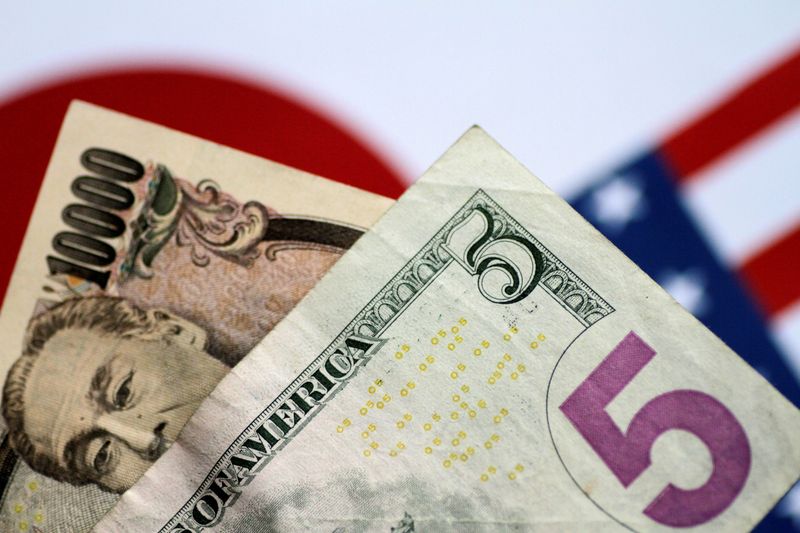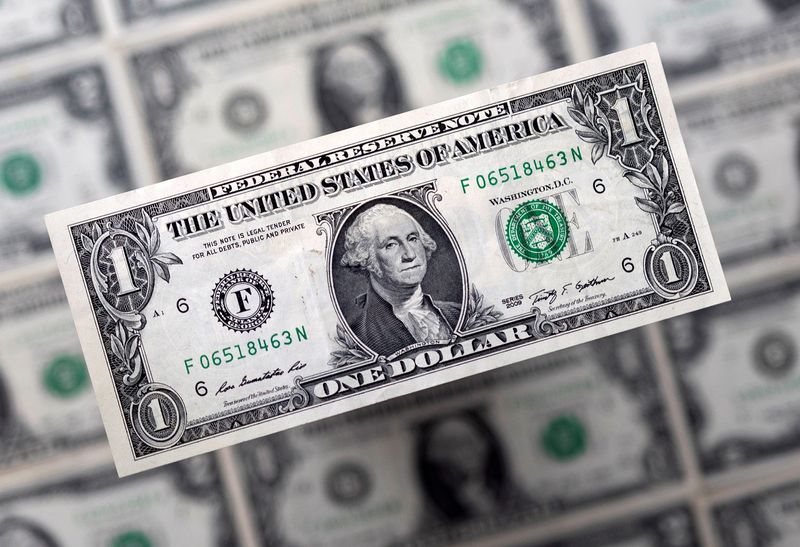By Caroline Valetkevitch
NEW YORK (Reuters) - The U.S. dollar index bounced back on Friday from recent declines as Federal Reserve officials said the central bank may need to be more aggressive to deal with inflation, while the dollar hit a fresh six-year high against the yen.
The U.S. dollar also was up 0.1% versus China's offshore yuan at 6.3716 yuan, registering little change following U.S. President Joe Biden's video call with Chinese President Xi Jinping, where Biden sought to prevent Beijing giving new life to Russia's invasion of Ukraine. The talks, which ended without big surprises, helped to boost stocks on Wall Street, however, especially in the technology sector.
Two of the Federal Reserve's most hawkish policymakers said the central bank needs to take more aggressive steps to combat inflation. A third, who just six months ago was the U.S. central bank's most dovish member, said he was open to that possibility.
The Fed hiked interest rates by a quarter of a percentage point Wednesday in an effort to tame inflation at 40-year highs. It was the first hike in three years, and the Fed also signaled that more rate increases are coming.
St. Louis Fed President James Bullard, who dissented on this week's action in favor of a half-point increase, said on Friday that officials should raise the Fed's overnight lending rate to more than 3% this year.
"For the dollar, hawkish Fed speak has put some wind back in its sails," said Joe Manimbo, senior market analyst at Western Union Business Solutions in Washington.
"It's playing up the more hawkish outlook for Fed policy. While the Fed was hawkish this week, their outlook for rates was still generally in line with market expectations."
The U.S. dollar index was last up 0.2% at 98.190, but well off its highs of the session, after declining for the past four days.
The dollar was up 0.4% against the Japanese yen and hit a fresh six-year high. The Bank of Japan left its ultra-accommodative policy settings unchanged on Friday, as widely expected, leaving it an outlier among developed-world central banks which are exiting coronavirus pandemic emergency measures.
The euro weakened as investors assessed developments in the Ukraine-Russia conflict, including news that Russia paid interest due on two sovereign dollar bonds.
The euro declined 0.4% to $1.1054 but rose 1.3% for the week in its biggest weekly percentage gain since the first week of February, when European Central Bank President Christine Lagarde signaled for the first time that interest rates will rise in the euro zone in 2022.
The commodity-sensitive Australian dollar was up 0.5% against the U.S. dollar, extending gains for a fourth day. Oil prices settled higher on Friday, but posted a second straight weekly loss. [O/R]
In cryptocurrencies, bitcoin was up about 2% and ether was up about 5%.
========================================================
Currency bid prices at 3:21PM (1921 GMT)
Description RIC Last U.S. Close Pct Change YTD Pct High Bid Low Bid
Previous Change
Session
Dollar index
98.1900 97.9650 +0.24% 2.642% +98.6240 +97.8300
$1.1054 $1.1093 -0.35% -2.77% +$1.1118 +$1.1004
119.1000 118.6050 +0.42% +3.46% +119.3950 +118.4750
Euro/Yen
131.64 131.54 +0.08% +1.01% +131.9100 +131.2000
0.9317 0.9370 -0.59% +2.12% +0.9382 +0.9315
Sterling/Dollar
$1.3184 $1.3145 +0.30% -2.51% +$1.3197 +$1.3111
Dollar/Canadian
1.2600 1.2625 -0.20% -0.34% +1.2646 +1.2593
Aussie/Dollar
$0.7410 $0.7375 +0.47% +1.94% +$0.7418 +$0.7361
Euro/Swiss
1.0300 1.0390 -0.87% -0.67% +1.0401 +1.0296
Euro/Sterling
0.8382 0.8434 -0.62% -0.21% +0.8440 +0.8378
NZ
Dollar/Dollar $0.6908 $0.6880 +0.38% +0.90% +$0.6913 +$0.6868
Dollar/Norway
8.7320 8.7870 -0.57% -0.83% +8.8260 +8.7365
Euro/Norway
9.6539 9.7543 -1.03% -3.59% +9.7650 +9.6545
Dollar/Sweden
9.4120 9.4146 -0.33% +4.37% +9.4814 +9.3972

Euro/Sweden
10.4044 10.4384 -0.33% +1.67% +10.4578 +10.3980
